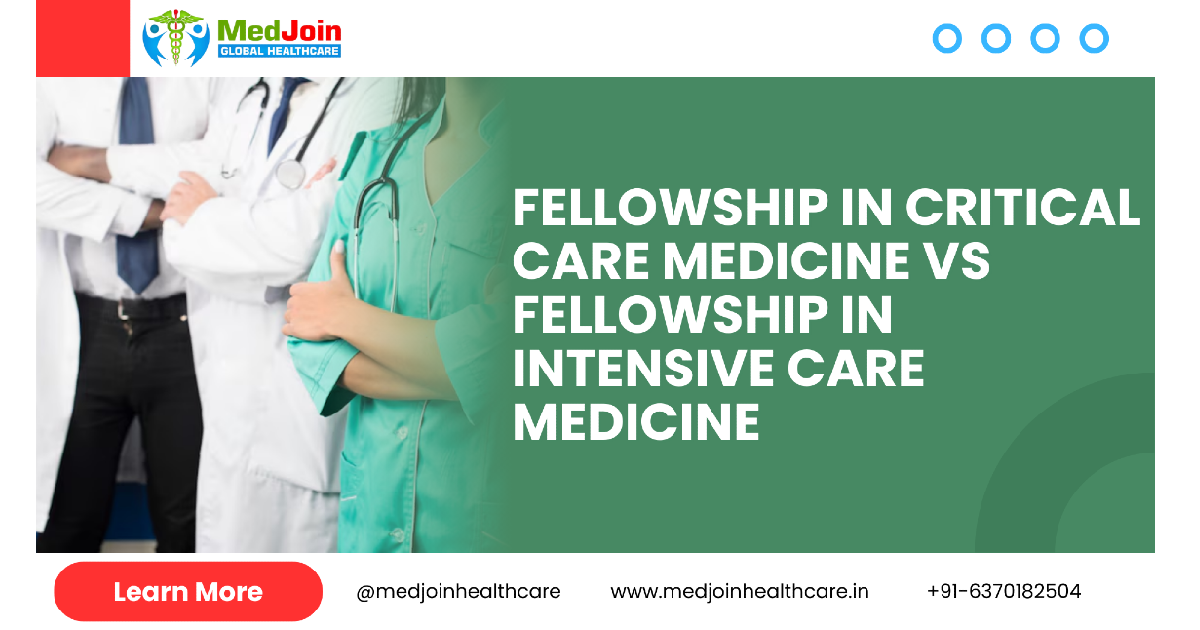
As the demand for highly skilled physicians capable of managing life-threatening conditions continues to rise, specialized training in critical care and intensive care medicine has gained immense relevance. Two prominent pathways that offer such advanced training are the Fellowship in Critical Care Medicine (FCCM) and the Fellowship in Intensive Care Medicine (FICM).
While the terms “critical care” and “intensive care” are often used interchangeably, there are nuanced differences in these fellowships based on country-specific guidelines, institutional preferences, and training curricula. This blog aims to demystify both fellowships, outline their scope, curriculum, eligibility, and career opportunities, and help you choose the right path in this vital medical specialty.
Table of Contents
- What is Critical Care and Intensive Care Medicine?
- Overview of Fellowship in Critical Care Medicine (FCCM)
- Overview of Fellowship in Intensive Care Medicine (FICM)
- Eligibility Criteria
- Curriculum and Training Structure
- Skills and Competencies Gained
- Key Differences Between FCCM and FICM
- Accreditation and Recognizing Bodies
- Career Scope and Opportunities
- Challenges and Rewards
- Conclusion
1. What is Critical Care and Intensive Care Medicine?
Critical care medicine (also known as intensive care medicine in some countries) is a specialized branch of medicine that deals with patients who are critically ill and require intensive medical attention. These patients often suffer from life-threatening conditions such as:
- Sepsis
- Respiratory failure
- Cardiac arrest
- Polytrauma
- Post-operative complications
Physicians trained in this field are equipped to manage advanced life support systems, mechanical ventilation, hemodynamic monitoring, and other sophisticated treatments typically administered in Intensive Care Units (ICUs).
2. Overview of Fellowship in Critical Care Medicine (FCCM)
The Fellowship in Critical Care Medicine (FCCM) is a specialized postgraduate training program designed for physicians who wish to acquire advanced expertise in managing critically ill patients.
Key Features:
- Duration: Typically 1 to 2 years
- Conducted by: Various medical colleges, hospitals, and institutes (e.g., Indian Society of Critical Care Medicine - ISCCM)
- Focus: Holistic patient management in ICUs, emergency resuscitation, diagnostics, and procedural skills
The FCCM emphasizes both theoretical knowledge and hands-on training, making it suitable for professionals from diverse backgrounds such as anesthesiology, internal medicine, emergency medicine, and pulmonology.
3. Overview of Fellowship in Intensive Care Medicine (FICM)
The Fellowship in Intensive Care Medicine (FICM) is another specialized program, more commonly used terminology in countries like the UK and Australia.
Key Features:
- Duration: Usually 1 to 3 years
- Administered by: Institutions like the Faculty of Intensive Care Medicine (UK) or Australian and New Zealand Intensive Care Society (ANZICS)
- Focus: Advanced ICU care with emphasis on research, leadership, and multidisciplinary collaboration
FICM is often pursued as a subspecialty fellowship after initial postgraduate training in fields such as anesthesia, internal medicine, or emergency medicine. It is widely recognized in international healthcare systems and can lead to consultant-level roles.
4. Eligibility Criteria
For FCCM (India and similar programs):
- MBBS with MD/DNB in Internal Medicine, Anesthesia, Pulmonology, Emergency Medicine, or equivalent
- Valid registration with the Medical Council
- Some programs may accept candidates with diploma-level qualifications (DA, DTCD) with relevant experience
For FICM (UK, Australia):
- Completion of a primary specialty training program (e.g., CCT in Anesthesia or Internal Medicine)
- Passing national exams (e.g., FRCA, MRCP, etc.)
- Registration with the General Medical Council (UK) or equivalent
Note: Each institution may have specific requirements regarding entrance tests or interviews.
5. Curriculum and Training Structure
While the exact structure varies across institutions, most fellowships share common components:
Clinical Training:
- Rotations through various ICU settings: medical, surgical, trauma, neurocritical care
Hands-on training in:
- Mechanical ventilation
- Airway management
- Invasive and non-invasive monitoring
- Hemodynamic stabilization
- CRRT and dialysis
- ECMO (in advanced centers)
Academic and Theoretical Components:
- Weekly lectures and journal clubs
- Case presentations and morbidity/mortality meetings
- Exposure to ICU ethics, end-of-life care, and family counseling
- Simulation-based learning and workshops
Research and Quality Improvement:
- Most fellowships require a research project or dissertation
- Participation in audits, ICU protocols, and SOP development
6. Skills and Competencies Gained
After completing either fellowship, a physician should be able to:
- Rapidly assess and triage critically ill patients
- Lead multidisciplinary teams in ICU
- Perform bedside procedures (central line insertion, arterial cannulation, intubation)
- Interpret complex lab data, imaging, and hemodynamic monitors
- Communicate effectively with families under stress
- Make ethically sound decisions in end-of-life care
- Understand ICU billing, documentation, and medico-legal frameworks
7. Key Differences Between FCCM and FICM
| Feature | FCCM | FICM |
|---|---|---|
| Region | India, parts of Asia | UK, Australia, some EU countries |
| Duration | 1–2 years | 2–3 years |
| Recognition | National (ISCCM, NBE) | International (GMC, ANZCA, JRCPTB) |
| Research Emphasis | Moderate | High |
| Clinical Focus | General critical care | Subspecialty-focused (e.g., neuro, trauma ICU) |
| Entry Route | MD/DNB/Diploma | CCT holders or equivalent specialty fellows |
8. Accreditation and Recognizing Bodies
In India:
- Indian Society of Critical Care Medicine (ISCCM) – Offers FCCS, IDCCM, and FCCCM
- National Board of Examinations (NBE) – Offers DNB Critical Care
- Medical Universities – Offer university-affiliated fellowships
In the UK:
- Faculty of Intensive Care Medicine (FICM)
- Affiliated with Royal Colleges (e.g., RCoA, RCEM, RCP)
In Australia & NZ:
-
College of Intensive Care Medicine of Australia and New Zealand (CICM)
9. Career Scope and Opportunities
Clinical Roles:
- Consultant Intensivist
- ICU In-charge in multispecialty hospitals
- Emergency department critical care physician
- ECMO specialist
Academic and Research:
- Faculty roles in medical colleges
- ICU protocol research and clinical trials
- Publications in peer-reviewed journals
Administrative and Leadership:
- ICU Quality Control & Accreditation
- ICU Operations Management
- Policy-making and healthcare planning
Global Opportunities:
Fellowship-trained intensivists are in high demand in the Middle East, Southeast Asia, UK, Australia, and parts of Europe, especially those with FICM or equivalent credentials.
10. Challenges and Rewards
- Long hours and emotional stress
- Dealing with high mortality and critical decisions
- Need for continuous upskilling
Rewards:
- Saving lives and making meaningful impact
- High respect in the medical community
- Strong demand and competitive salaries
- Opportunities to lead innovation in critical care technology and protocols
Conclusion
Whether you choose the Fellowship in Critical Care Medicine (FCCM) or the Fellowship in Intensive Care Medicine (FICM), both paths lead to a deeply impactful, challenging, and rewarding medical career. These fellowships not only equip you with the technical expertise required to handle critically ill patients but also shape you into a leader capable of driving ICU excellence.
In an era where pandemics, trauma, and non-communicable diseases increasingly lead to critical illness, intensivists are more important than ever. By investing in one of these fellowships, you're choosing a path of service, leadership, and continuous growth.
Interested in Pursuing a Fellowship?
Start by identifying accredited programs, preparing for required entrance exams, and gaining hands-on ICU experience early in your residency. The road may be tough, but the destination is profoundly fulfilling.






